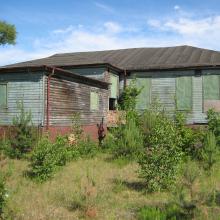Project MoUrning
The Sachsenhausen concentration camp—which was the headquarters of the whole Nazi concentration camp system—sits in a quiet residential area in the city of Oranienburg, a municipality adjacent to Berlin. In addition to the single-family homes and tree-lined streets that abut the camp, the neighborhood also contains a large and contested site: an area that had been used by the Nazis for SS-officer barracks and homes. In addition to housing, the area contained facilities for the camp personnel such as a medical clinic, a canteen, and training grounds. Some of these structures have been used continuously for a variety of programs since the end of the war, while others were abandoned and turned into ruins.
In 1992, the city of Oranienburg organized a competition for a masterplan to transform this area into a mixed-use residential development. Most architects complied with the program. Daniel Libeskind, however, submitted a counter-proposal in which he argued that the residential complex would efface and trivialize the history of the site. Libeskind’s design proposed a public interest program with educational, cultural, and health venues that would have served the Oranienburg population, while memorializing the history of the place.
Libeskind was disqualified for not following the brief, but he earned an honorary mention. His project then spurred a collective discussion and critical revision of the original residential program. Eventually the city council abandoned the residential project in favor of Libeskind’s proposal. His office worked on the design over many years in conversation with the city of Oranienburg and other partners, but the proposal was never built. Instead, the Land (state) of Brandenburg used a large portion of the site to build the campus of its Police Academy, which opened in 2006.
The images in this gallery are accompanied by select excerpts from an interview with Daniel Libeskind conducted by Daniela Sandler at Studio Libeskind in New York City in October 2014. The excerpts have been transcribed in summarized form below the audio files.

